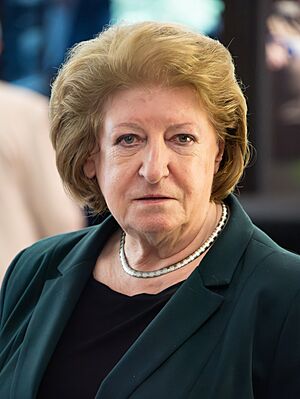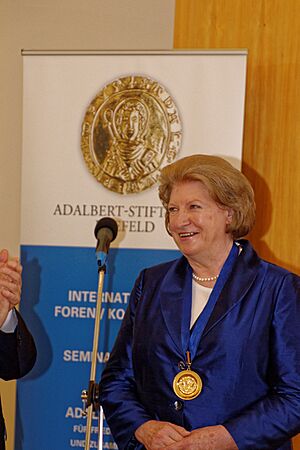Hanna Suchocka facts for kids
Quick facts for kids
Hanna Suchocka
OB GCPO
|
|
|---|---|

Suchocka in 2024
|
|
| Prime Minister of Poland | |
| In office 8 July 1992 – 26 October 1993 |
|
| President | Lech Wałęsa |
| Deputy | Henryk Goryszewski Paweł Łączkowski |
| Preceded by | Waldemar Pawlak |
| Succeeded by | Waldemar Pawlak |
| Minister of Justice Public Prosecutor General |
|
| In office 31 October 1997 – 8 June 2000 |
|
| Prime Minister | Jerzy Buzek |
| Preceded by | Leszek Kubicki |
| Succeeded by | Lech Kaczyński |
| Member of the Sejm | |
| In office 18 June 1989 – 18 October 2001 |
|
| In office 23 March 1980 – 31 July 1985 |
|
| Personal details | |
| Born | 3 April 1946 Pleszew, Poland |
| Political party | Alliance of Democrats (Before 1989) Solidarity (1989–1990) Democratic Union (1990–1994) Freedom Union (1994–2000) |
| Alma mater | Adam Mickiewicz University M.Jur. (1968), PhD (1975), Habilitation (2015) |
| Occupation | legal scholar, diplomat |
| Awards | |
| Signature | |
Hanna Stanisława Suchocka (born 3 April 1946) is a Polish politician, lawyer, and professor. She made history as the first woman to become the Prime Minister of Poland. She led the country from July 1992 to October 1993.
Suchocka was the 14th woman in the world to be appointed as a prime minister. Before her, no woman in Poland had ever held this powerful job. She is also known for her work as a legal expert and a diplomat.
Contents
Early Life and Education
Hanna Suchocka was born in Pleszew, Poland. She grew up in a Catholic family where education was very important. Her grandfather was a university teacher. Her grandmother, Anna, was one of the first women in the Polish parliament after Poland gained independence in 1918.
Inspired by her family, Hanna studied law at Adam Mickiewicz University in Poznań. She became a researcher and earned a PhD in Constitutional Law, which is the study of the laws that define how a country is run. She later became a professor and has taught at several universities.
Start of Her Political Career
In 1969, Suchocka joined the Democratic Party. From 1980 to 1985, she was a member of the Sejm, which is Poland's parliament. During this time, she also worked as a legal advisor for Solidarity, a famous movement that fought for workers' rights and freedom in Poland.
She was known for standing up for her beliefs. In 1981, she was one of the few politicians who voted against a new law that made Solidarity illegal. Because of her brave actions, she was suspended from her political party. But with support from Solidarity, she was elected to parliament again in 1989.
Poland's First Woman Prime Minister
In 1992, Hanna Suchocka became the Prime Minister of Poland. This was a surprise to many people. At the time, Polish politics was very unstable, and governments changed often. Suchocka was chosen because she was known for being calm and good at finding compromises.
Her goal was to bring people together and help Poland change from a communist country to a capitalist one. This meant moving towards a system with more economic freedom. She was approved by the parliament with a vote of 233 to 61.
Challenges in Office
Being prime minister was not easy. Her government was a coalition, meaning it was made up of seven different political parties. These parties often disagreed with each other.
Suchocka's government faced many strikes from workers who wanted higher pay. She believed in market reforms and took a firm stance against the strikes. When she refused to give pay raises to teachers and health workers, she lost a key vote in parliament by just one vote. This is called a vote of no-confidence.
After this vote, President Lech Wałęsa decided to hold new elections. Before leaving office, her government signed a concordat, which is a special agreement, with the Holy See (the government of the Catholic Church). This was a major topic of debate in the next election. Suchocka's time as prime minister ended after the new parliament was elected in 1993.
Later Career and International Work
After her time as prime minister, Hanna Suchocka remained active in politics. In 1994, she helped create a new political party called the Freedom Union. From 1997 to 2000, she served as the Minister of Justice in another coalition government.
Suchocka also became an important figure on the world stage.
- From 2002 to 2013, she was Poland's Ambassador to the Holy See in the Vatican.
- She is a member of the Council of Women World Leaders, a group of former and current female presidents and prime ministers. The group works on important issues for women and fair development around the world.
- In 1994, Pope John Paul II appointed her to the Pontifical Academy of Social Sciences.
- In 2014, Pope Francis chose her to be part of a special group called the Pontifical Commission for the Protection of Minors.
Hanna Suchocka's career shows her dedication to law, politics, and public service, both in Poland and internationally.
See also
 In Spanish: Hanna Suchocka para niños
In Spanish: Hanna Suchocka para niños
 | Anna J. Cooper |
 | Mary McLeod Bethune |
 | Lillie Mae Bradford |


